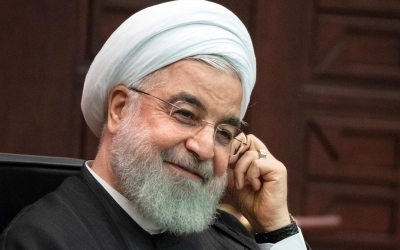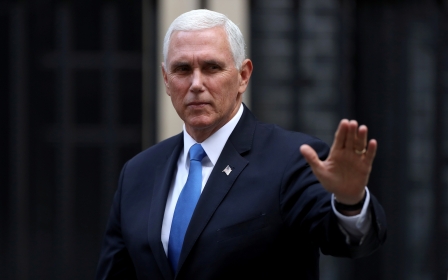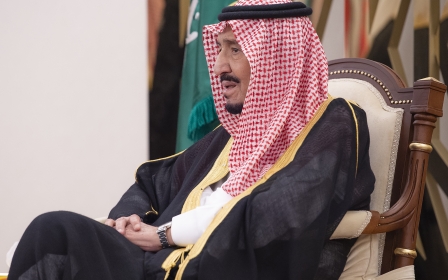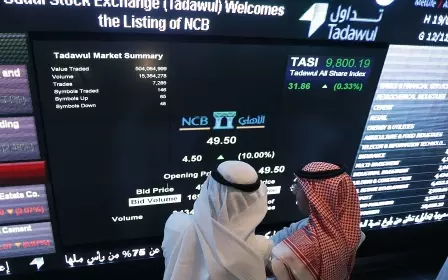Saudi Arabia says oilfield attack came 'from north' and blames Iran
Saudi Arabia said on Wednesday there was "unquestionable evidence" that last Saturday's attack on Saudi oil facilities was sponsored by Iran and was launched from the north of the country.
Speaking on Wednesday, Saudi Defence Ministry spokesperson Colonel Turki al-Malki said that Iranian drone technology was used alongside cruise missiles in the attack targeting Abqaiq and Khurais, two key Aramco facilities in eastern Saudi Arabia.
"The attack was launched from the north and unquestionably sponsored by Iran," Malki told a news conference in Riyadh, without offering any further details.
US officials also continued to blame Iran for the incident.
US Secretary of State Mike Pompeo, who is currently in Jeddah for talks with Crown Prince Mohammed bin Salman, called the attack an "act of war" on Wednesday, AFP reported.
New MEE newsletter: Jerusalem Dispatch
Sign up to get the latest insights and analysis on Israel-Palestine, alongside Turkey Unpacked and other MEE newsletters
Pompeo is also due to travel to Abu Dhabi for talks with Crown Prince Mohammed bin Zayed, the de facto ruler of the United Arab Emirates.
Yemen's Houthi rebels initially claimed responsibility for the attack, but Yemen lies to the south of Saudi Arabia.
US officials have suggested that the attack came from Iran itself, while Iraqi intelligence sources have told Middle East Eye that it was launched from southern Iraq.
The Saudi spokesperson showed journalists on Wednesday debris of a suspected Iranian drone used to attack the oilfields.
The Saudi statement came as Iran continued to deny any involvement and the country's leaders again suggested that the Houthis were behind the attacks.
Tehran sends diplomatic note
In a diplomatic note sent to the United States on Wednesday, Tehran "emphasised that Iran has not played any role in this attack and denies and condemns" US claims to the contrary, Iranian state media reported.
The ISNA news agency said the note had been delivered via the Swiss embassy in Tehran.
The note also threatened an "immediate reaction" to any military attack and said that retaliation would not be “limited to its source”.
The attacks have paralysed the Saudi oil industry, causing oil production to drop by half and stoked already heightened tensions between Tehran and Washington following US President Donald Trump's withdrawal from an international deal under which Iran curtailed its nuclear activity.
Bin Salman said on Wednesday that the attacks were a "real test" of global will, while urging the international community to take a "firm stance", state media reported.
US Vice President Mike Pence said on Tuesday that the US was "'locked and loaded and we're ready to defend the interests of our allies in the region".
But he said Washington was still "evaluating the evidence".
"We're consulting with our allies, and the president will determine the best course of action in the days ahead," Pence said.
Iranian President Hassan Rouhani on Wednesday once again attributed the attacks to the Houthis, which Tehran has supported in its war against a Saudi-led coalition and Yemen's exiled government, describing it as a "warning".
"The Yemenis... haven't hit a hospital, they haven't hit a school, they haven't hit Sanaa bazaar. They just hit an industrial centre... to warn you," Rouhani said after a cabinet meeting.
"Learn lessons from this warning and consider that there could be a war in the region."
Iranian Foreign Minister Mohammad Javad Zarif also linked the attacks to the war in Yemen, writing on Twitter: "US is in denial if it thinks that Yemeni victims of 4.5 yrs of the worst war crimes wouldn't do all to strike back."
Rouhani and Zarif are due to travel to New York for next week's United Nations General Assembly, but officials told state media on Wednesday that the trip would likely be cancelled if the US did not issue the pair with visas within the next few hours.
Middle East Eye delivers independent and unrivalled coverage and analysis of the Middle East, North Africa and beyond. To learn more about republishing this content and the associated fees, please fill out this form. More about MEE can be found here.






